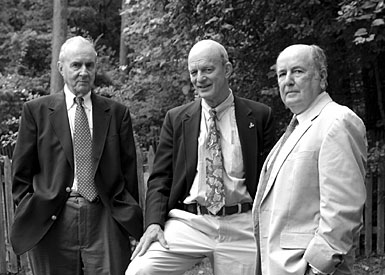Emeriti in 2002 represent a DMS "brain drain"
The psychiatrist, neurologist, and psychologist granted emeritus status this year have at least two things in common: their careers were focused on the brain, and they plan to keep their own brains busy in retirement.
John Nemiah, M.D., was starting his third—make that fourth— career when he joined the DMS faculty as a professor of psychiatry in 1985. The first was as a psychiatrist at Massachusetts General Hospital from 1948 to 1968. The second was at Harvard's Beth Israel Hospital from 1968 to 1985. And what could be considered his third career, although it overlapped with his time at Harvard and Dartmouth, was serving for 15 years as editor of the distinguished American Journal of Psychiatry.

|
|
All of this year's new emeriti had careers involving the brain. From the left are psychiatrist
John Nemiah, neurologist Alex Reeves, and psychologist Bert Nadeau. |
The son of Royal Nemiah, a longtime professor of classics at Dartmouth College, John Nemiah grew up in Hanover and so welcomed the opportunity to "retire" here. Ever since his return he has been an unpaid, active- duty, part-time professor at DMS. His major task was to supervise residents.
When Nemiah got his M.D. from Harvard Medical School in 1943, he was entering psychiatry just as psychoanalysis was gaining in popularity. He became well known for practicing psychodynamic therapy, in which patients bring their true feelings to the surface so they can experience and understand them. The emphasis in psychiatry has shifted during Nemiah's career(s) from psychotherapy to pharmacological treatments, and from institutionalizing mentally ill patients to integrating them into community settings.
Now that he's really retiring, he plans to read up on the history of psychiatry, with the aid of a machine that "outwits the central blindness" he suffers from by magnifying text. He's also looking forward to spending more time with his wife, Margarete, and enjoying visits with their children and grandchildren.
Alexander Reeves, M.D., a professor of medicine (neurology) and of anatomy, may have officially retired after serving for 30 years as neurology section chief, but he certainly doesn't intend to slow down. He will be moving to a house—built in 1842 by a ship's captain—that he and his wife bought on Chesapeake Bay so they can be near her new job at the Virginia Museum of Fine Arts in Richmond. But he'll return to New Hampshire often to teach at DMS and stay active in Granite State medical societies, though he is also considering applying for a license to practice medicine in Virginia.
Reeves got his M.D. from Cornell in 1963 and did an internship in medicine at Duke and a residency in neurology at Cornell's New York Hospital. Being hired as chief of DHMC's Section of Neurology in 1971 made Reeves New Hampshire's third neurologist. By the time he retired, the section had grown from two neurologists to 16 and the state's roster to 62.
In retirement, Reeves also plans to bike, paint, cook, fly- fish, and travel. His travels will take him to California to celebrate the 50th anniversary of a company his father cofounded— Cinerama, a 1950s forerunner of big-screen IMAX movies—and to see his daughter, actress Perry Reeves, as well as to Alaska to see his other daughter, Wendy, and her family. He also expects to be seeing more of his sons: Lex, an art dealer in Richmond, and Nathaniel, who is moving to Virginia Beach.
J. Bertrand Nadeau, Ph.D., an associate professor of psychiatry, has been active in community mental health for 25 years. He got his Ph.D. in psychology from the University of Minnesota in 1967, came to DMS in 1969, and immersed himself in the community right away.
There were few school psychologists in the region then, so he helped area schools at no charge. Later, he was instrumental in bringing one of the first school psychologists to the region, after people "began to recognize the association between behavior problems and learning disabilities," he says.
He played a key role in establishing a local community-based mental-health organization— West Central Community Mental Health Services—and was director of children's services there as well as director of clinical services for Grafton County.
In the 1980s, he reduced his administrative load so he could return to clinical work with children and their families. For the last few years, he has worked exclusively with adults and couples and will continue to do so in the private practice he recently started. He also intends to stay busy training residents, playing golf and bridge, working on projects at home, traveling with his wife to Mexico and Europe, and visiting children and grandchildren in the Upper Valley, Boston, New York, and Chicago.
Laura Stephenson Carter
